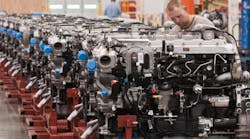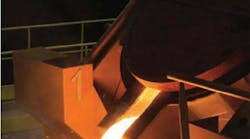Ford Motor Co. will postpone closing its Cleveland (OH) Casting Plant by one year if the recently agreed four-year contract is confirmed by the company's United Autoworkers employees, according to the Associated Press and local news reports. Ford and the UAW agreed to the tentative contract on November 3, following a pattern set by contracts between the union and General Motors Corp. and Chrysler L.L.C.
In each agreement the union has accepted responsibility for retiree health-care costs, in exchange for specific commitments on plant improvements and job security.
Roughly 54,000 Ford workers are due to begin voting on the contract proposal November 7.
In May Ford announced plans to close the 56-year-old Cleveland Casting Plant in 2009, referring to an earlier "commitment to match its manufacturing capacity with actual customer demand." Ford has made clear its intent to minimize in-house casting, and has already closed casting operations in Leamington, England, and Windsor, ON.
The Cleveland Casting Plant produces cast-iron crankshafts for Ford's four-cylinder engines, as well as engine blocks, and bearing caps, among other products for Ford's F-Series Super Duty trucks, E-Series vans, and the Ford Expedition and Lincoln Navigator SUVs. It has 1,100 hourly and 118 salaried workers.
Ford also intends to idle the adjacent Cleveland Engine Plant No.1 for one year.
A summary of the contract
posted by the UAW reveals that Ford will contribute $13.2 billion to a Voluntary Employee Beneficiary Assn., or VEBA, that the union will administer beginning in 2010, to cover retiree health-care costs. Until then, Ford will pay $2.2 billion for retiree health-care costs.
For Ford's UAW workers, the contract will provide a $3,000 signing bonus and lump-sum payments of 3% in the second year, 4% in the third year, and 3% in the fourth year.
Ford agrees to build five new flexible body shops at assembly plants, and will invest $200 million for new technology at stamping and powertrain plants. Finally, Ford agrees not to sell or close any plants other than three that have been named: an assembly plant in St. Paul, MN, a transmission plant in Batavia, OH, and the Cleveland Casting Plant. The closings at St. Paul and Cleveland would be delayed by one year, however.
The summary indicates the UAW's vice president and director of the union's relations with Ford, Bob King, would be seated on the company's Manufacturing Operating Committee "where critical decisions are made about current operations and future product."
Latest from Uncategorized
Latest from Uncategorized
Uncategorized
Newsletter Confirmation Page
May 27, 2013
Uncategorized
Vented Safety Helmet
July 21, 2012
Melt/Pour
A Plan Comes Together
July 5, 2012
Uncategorized
Convert Microscope to Videoscope
July 2, 2012
Uncategorized
Robot Programming with Tablet-PC
July 2, 2012



